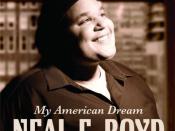Fitzgerald not only condemns the American Dream but sets the death and downfall of the American Dream as the primary theme of the novel. Throughout the novel Fitzgerald deliberately makes all characters with money appear to be unhappy, dysfunctional, snobbish, and immoral, thus contradicting the stereotyped idea of the American Dream. The American Dream that includes a happy family, living together, having lots of money and living happily ever after.
The unhappiness of the wealthy class is portrayed by Fitzgerald's very poetic and beautiful style of writing. Gatsby's love for Daisy is shown when Gatsby is telling Nick some of his past. "His heart beat faster and faster as Daisy's white face came up to his own. He knew that when he kissed this girl, and forever wed his unutterable visions to her perishable breath, his mind would never romp again like the mind of God. So he waited, listening for a moment longer to the tuning fork that had been struck upon a star.
The he kissed her. At his lips' touch she blossomed for him like a flower and the incarnation was complete" (117). Can you imagine being Gatsby at this moment? Feeling so passionately for Daisy and at one day, one single moment, losing all contact with her, for what could have been forever? The loneliness, depression, and sadness felt here is not part of the American Dream package. Gatsby is supposed to be this happy, carefree man who has everything in life, but through Fitzgerald's deliberate approach to indirectly show the reader just how much pain Gatsby is in, the audience begins to see the realism portrayed here. Daisy is another character in which the unfortunate wrath of unhappiness overtakes her beautiful, money-filled life handed down to her. If all went as planned Daisy would...


